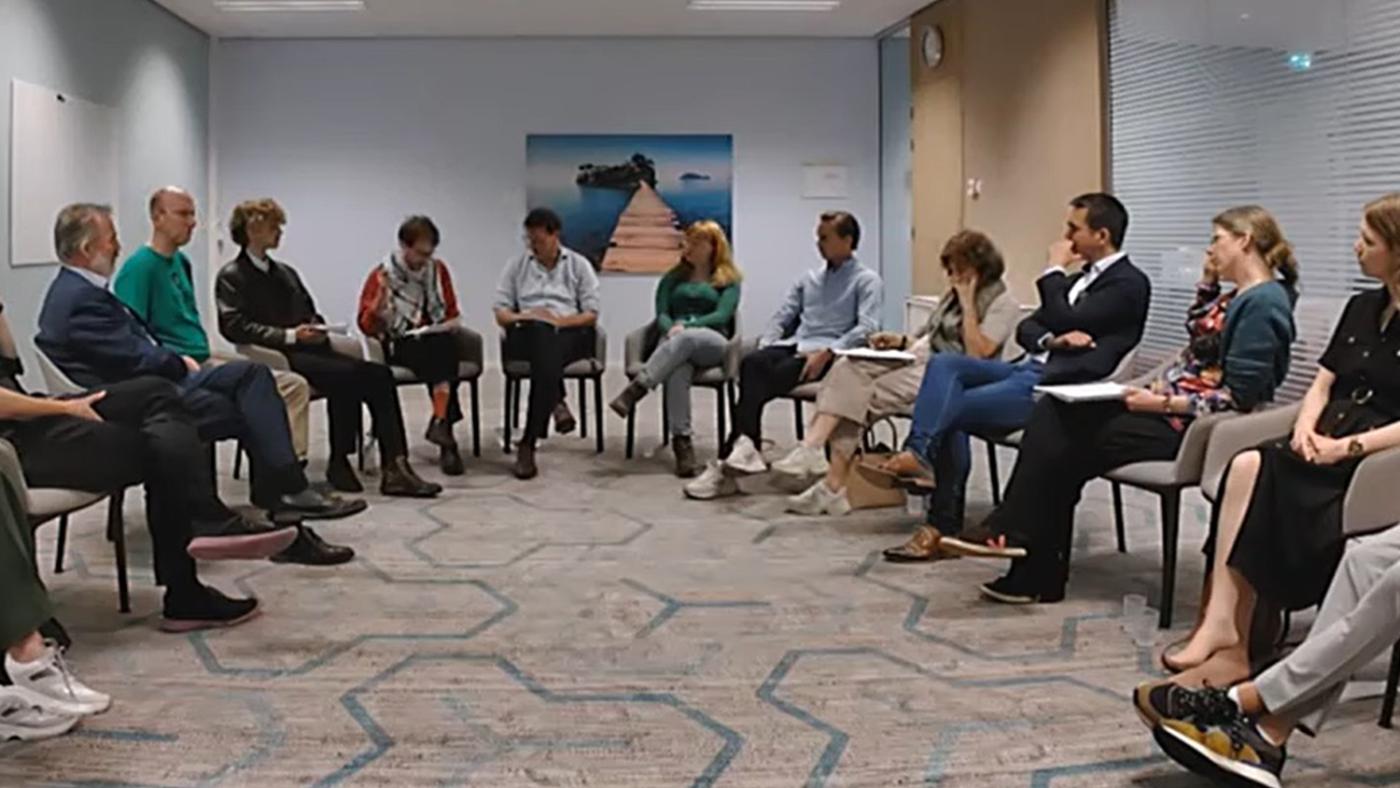Other universities are struggling, too
Super difficult, such a discussion between protesters and administrators

Teachers, students and administrators of Utrecht University were ready for a dialogue with pro-Palestine protesters but all they got was a "statement". When given the floor, the spokesperson of the student movement is given the floor and simply reads out a statement calling the talks impossible. Then he walked away.
A few minutes earlier, the moderator had called upon everyone to "really" listen to one another. The thirteen people present — some of them Jewish, others pro-Palestinian; some were administrators, others were scientists — all had an intense year behind them, full of demonstrations, occupations and accusations of complicity in genocide. Activists don’t feel heard, while administrators feel that their rules are being trampled upon. Listening seemed like a great way to get closer, but it didn’t work out.
“Non-negotiable”
It’s not the only university where the discussion grinds to a halt. In Amsterdam, where the protests started almost a year ago, a spokesperson of the student movement also says there’s “very little” contact between students and the university. Or take Groningen. There, administrators do want to talk, but don’t want to listen, the students claim. “We demand that the ties to Israel are completely severed. This is non-negotiable.”
That the discussion has come to a stop is also what consensus specialist historian James Kennedy, professor at Utrecht University, observes. “There are many attempts to organise gatherings, debates and dialogues. And sometimes they get stuck.” And sometimes they don’t, because there’s a lot we don’t hear, Kennedy insists on emphasising.
Of course, a discussion can also be abused to stifle the debate, says Kennedy. “But most people in the Netherlands still want discussions to be successful. If we don’t manage to reach an agreement by talking to one another, we’ve failed. Well, it’s the other party that did most of the failing, but still.”
It works
The great thing is that having a good discussion works. Carla Roos, Assistant Professor at Tilburg University, studies thorny or polarising topics. She recently came across research showing that polarisation decreases when people are open to listening to others. This results in parties getting closer to each other.
So, why don’t activists and administrators just talk to each other? There may be a simple reason for this: sometimes, activists want to increase the pressure and get the public opinion on their side first. “Saying you aren’t heard is also a means of pressure”, says Roos.
Increasing the pressure and forcing things to go your way is indeed one of the strategies of the protesters, says conflict specialist Carsten de Dreu, Professor at the University of Groningen. As far as he’s concerned, this conflict is following the regular pattern: first, there are attempts to discuss things, but then the universities dismiss them. That's when activists switch to coercion or violence to get their way.
Don’t forget that conflicts are more visible than constructive talks. Just like Kennedy, De Dreu emphasises that constructive talks may be taking place under the radar. “However, some protests have escalated, which makes the space to reach an agreement by talking to each other very limited.”
Administrators too may have their reasons to avoid the discussion, De Dreu explains. Protesting takes a lot of time and energy and students are putting their reputations on the line. And in a while, they’ll have to graduate too. “Administrators obviously hope the protest will fizzle out on its own. Based on previous protests, that’s also the most likely scenario. Only when the protests go on long enough will there be a point where it’s more costly for both parties to uphold the protest than to talk to each other.”
With whom
But who should you have that discussion with? There are conflicting interests, so firm negotiations are in order, but that’s tricky to do with activists who often want to stay anonymous and don’t have clear leaders. And once you’ve made agreements, will everyone abide by them? Both De Dreu and James Kennedy have their doubts in this respect. “Compared to the past, the protesters are more democratic as they give less room to leaders. But this does hamper the usual method of negotiating.”
The protesters don’t see it that way. They’re not the problem, they believe. “I’ve also been on the central student council”, says Carlos van Eck, who is involved in the protests at the University of Amsterdam. “You can talk a lot, but will this lead to something being arranged? The preconditions to a good talk aren’t there. It’s incredible how difficult it is to have a fruitful discussion with the board.”
That’s the very reason the protests started, says Van Eck. “I’m always up for having a good discussion, I look for reconciliation, but with the university, it seems impossible. Before the occupations, we tried to get through to them for half a year, but everything was summarily dismissed. The discussion only starts when a building is occupied.”
Mutual
Without discussion, one automatically ends up in a situation where only one party can win. It becomes a zero-sum game, says De Dreu, where one player’s victory means the other player’s defeat.
You have to get past this, however difficult that may be. With a good talk, administrators can gain trust, Roos thinks. And whatever happens, don’t let it be just a theatre performance to relax the atmosphere, she says. “People know full well when administrators are only pretending to listen.”